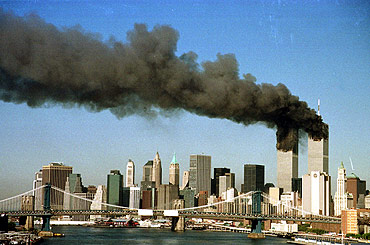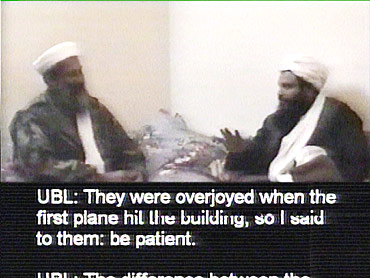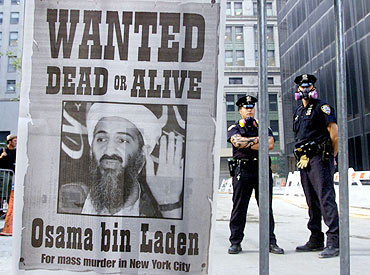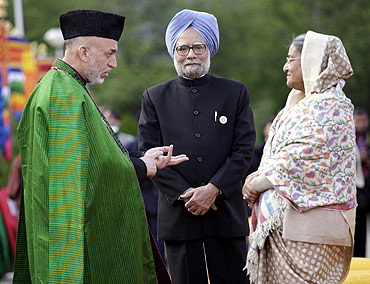This article was first published 14 years ago
Home »
News » How Al Qaeda has weakened since 9/11
How Al Qaeda has weakened since 9/11
Last updated on: December 16, 2010 22:02 IST
Image: The towers of the World Trade Center pour smoke shortly after being struck by hijacked commercial airplanes in New York on September 11, 2001
Terror group Al Qaeda's senior leadership based in Pakistan is "weaker" than anytime since the 9/11 attacks and is under "more sustained pressure," United States President Barack Obama's review of the Af-Pak situation said on Thursday.
The review claims significant progress in disrupting and dismantling the Pakistan-based leadership and cadre of Al Qaeda over the past year.
...
Image: Osama bin Laden is seen in this video image relased by the US defence department
Al Qaeda's senior leadership has been depleted, the group's safe haven is smaller and less secure, and its ability to prepare and conduct terrorist operations has been degraded in important ways," says a five-page overview of the report, which is set to be unveiled by Obama.
The annual Af-Pak policy review also says that as a result of consistent anti-terror measures in the region, the senior leadership of al-Qaeda based in Pakistan "is weaker than any time after 9/11".
Image: New York police stand near a wanted poster printed on a full page of a New York newspaper
It said that the US strategy for Afghanistan and Pakistan is centred on "disrupting, dismantling, and defeating Al Qaeda in the theatre and preventing its capacity to threaten America, its citizens and allies."
"While it will take time to eventually defeat Al Qaeda, we are taking steps to prevent terrorist groups from regenerating over time or reestablishing a safe haven in the region that would pose a strategic threat to the US homeland and to our allies and interests abroad," the report said.
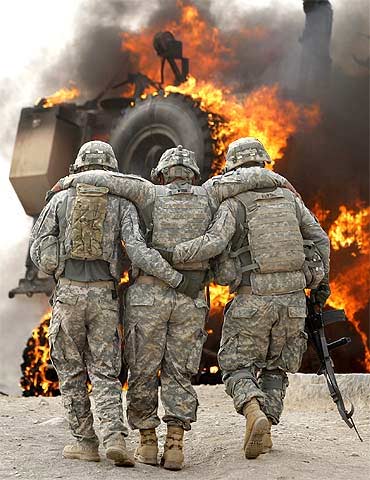
It said the US remains "relentlessly focused" on the Pakistan-based Al Qaeda because of the strategic nature of the threat posed by its leadership, and in particular the group's continued pursuit of large-scale, catastrophic anti-Western attacks and its influence on global terrorism.
"We believe core Al Qaeda continues to view the United States homeland as its principal target, and events over the past year indicate some of its affiliates and allies also are more aggressively pursuing such attacks," it said.
Image: In May, the New York police foiled a terror plot at Times Square
Al Qaeda's eventual strategic defeat will be most effectively achieved through the denial of sanctuaries in the region and the elimination of the group's remaining leadership cadre, it said.
Achieving these goals alone will not completely eliminate the terrorist threat to US interests, the report said, adding there are a range of other groups, including some affiliated with Al Qaeda, as well as individuals inspired by Al Qaeda.
Image: Afghanistan's President Hamid Karzai speaks with Bangladesh's Prime Minister Sheikh Hasina and Prime Minister Manmohan Singh
Photographs: Rupak De Chowdhuri/Reuters
US plans to intensify its regional diplomacy in 2011 by involving key countries of the Asian region as part of its goal to involve them in establishing "long-term peace and stability" in Afghanistan and Pakistan, according to a report on the Af-Pak strategy.
India, whose developmental role in Afghanistan has been highly appreciated by the US and other countries, is expected to be involved in a big way in any resolution of the conflict.
While there is no mention of India in the five-page overview of the report provided to the media, it is evident that the US wants India to play a major role in achieving its goals in Afghanistan.
"In 2011, we will intensify our regional diplomacy to enable a political process to promote peace and stability in Afghanistan, to include Afghan-led reconciliation, taking advantage of the momentum created by the recent security gains and the international consensus gained in Lisbon," said the overview of the Af-Pak policy annual review conducted by the White House.
Source:
PTI© Copyright 2025 PTI. All rights reserved. Republication or redistribution of PTI content, including by framing or similar means, is expressly prohibited without the prior written consent.
